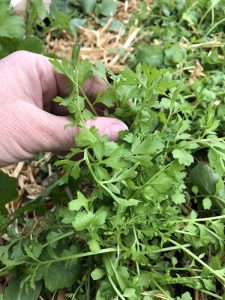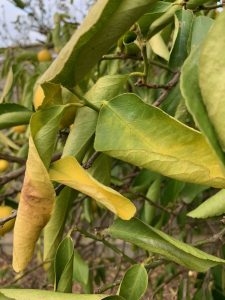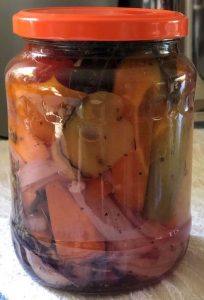Thanks to all the people who have contributed to this week’s newsletter: Deb Thomson, Georgie Nathan, Jane Dyer, Jo Buckle, Katrina Forstner, Kayla Blackmore, Lee Hirsh, Louise Nolan, Marina Bistrin, Penny Smith, Rebecca Haschek, Robin Gale-Baker, Sandie Downes, Sarah Mathers, Sofiah Fauzi and Trish Kent.
We would love to hear from more of you and include some of your words about any food-related matters in future newsletters. Email us with your contribution(s).
Soil acidity (by Rebecca Haschek)
Rebecca Haschek, from Diamond Creek, has recently been undertaking post graduate studies in Agriculture, including soil science. She has now written an article for our website with some thoughts on soil acidity.
The article starts by discussing what soil acidity is and why it is an issue. Soil acidity is actually a measure of the acidity of the water within soil, rather than any solid materials, and the water is acidic if there are more hydrogen ions (H+) than hydroxide ions (OH–). Slightly acidic water (a pH of 6 to 7) is good for most plants but higher levels of acidity result in aluminium being released, stunting root growth and severely limiting crop yields, and allows chemical processes to tie up nutrients, making them unavailable to plants.
One way that soil becomes acidic is through the removal of plant material: plants exchange ions with their surrounding water, resulting in the plants becoming alkaline and the soil acidic; when plant material is harvested, the corresponding alkalinity of the plant is removed, and the soil is acidified. The other way that soil becomes acidic is through nitrate leaching, whereby nitrate ions move deep into the soil, leaving the accessible soil acidic. In both cases, the process is irreversible.
Rebecca has several suggestions for how you should manage your soil acidity. First, use slow-release fertilisers so that there is less excess nitrate in your soil and thus less leaching. Second, use crushed limestone to lessen the acidity of your soil. Third, because it is hard to determine how much crushed limestone to add, use soil pH test kits to monitor your soil acidity.
Persian land cress (by Katrina Forstner)
[Katrina Forstner, from Preston, was recently appointed as the coordinator of Span Community Garden in Thornbury (Congratulations, Katrina!). One of the edible plants that they grow is Persian land cress (Lepidium sativum), which was introduced to them by one of their Persian volunteers. Here are a few words from Katrina about it.]
 Persian land cress (Lepidium sativum) is in the Brassicaceae family. It is a very old vegetable from the Middle East. Sativum translates as ‘from seed‘, meaning it was cultivated, and you can trace its history back to early Persian vegetable gardens in 400BC. In Persian, it is Sahi.
Persian land cress (Lepidium sativum) is in the Brassicaceae family. It is a very old vegetable from the Middle East. Sativum translates as ‘from seed‘, meaning it was cultivated, and you can trace its history back to early Persian vegetable gardens in 400BC. In Persian, it is Sahi.
It is used in Persian cuisine as a side dish or as part of a salad. It had a milder, peppery flavour compared to other garden cresses. It can also be used in a sandwich, topped on omelettes, or blended into sauces such as pesto.
Small and fast growing. Grows 25cm in height. Harvest between Spring and Autumn. As part of an organic garden, it’s a welcome addition for gardeners as a natural pest control for cabbage white butterfly (Pieris rapae) as it acts as a sacrificial plant for brassicas.
What’s in season for you to buy in August?
Kayla Blackmore, who is the market manager of Coburg Farmers’ Market, says that the following is in season for you to buy in August:
Fruit: apples, avocado, mandarins, tamarillo, pears, lemons, limes.
Vegetables: Brussels sprouts, celeriac, kale, cabbage, cauliflower, beetroot, salad greens, leeks, onions, potatoes.
Spotlight on romanesco
 Gosh, nature is a fun little playground! Was there were ever a veggie that caught more attention at the market, or had the kids more eager to eat their greens, than the funky looking romanesco? Debate continues as to whether this brassica is closer to a broccoli or a cauliflower, but I like to think that it can hold its own in the veggie world!
Gosh, nature is a fun little playground! Was there were ever a veggie that caught more attention at the market, or had the kids more eager to eat their greens, than the funky looking romanesco? Debate continues as to whether this brassica is closer to a broccoli or a cauliflower, but I like to think that it can hold its own in the veggie world!
Romanesco is in season now in Victoria and pairs beautifully with other brassicas and root vegetables, along with lashings of olive oil, butter and cream. Try roasting it and sprinkling with dukkah, slice it and bake it with cream and cheese (à la au gratin) or use it as a fun ingredient in your next curry. You’ll be able to pick up romanesco at the farmers markets for the next few weeks. Be sure to get the kids to try it!
Read Kayla’s previous monthly spotlights on our website.
Future of agriculture in Nillumbik survey
With the support of Deakin University and Plan-it Rural, Nillumbik Council is undertaking a Future of agriculture in Nillumbik project to understand the existing agricultural assets in the area and to consider how agriculture can be supported into the future. Their next step is an online survey targeting local agricultural businesses and landholders of agricultural land in Nillumbik to discover what they see as the key opportunities and barriers to the local industry, and their insights into how Council can better support the agricultural sector into the future. Read more and potentially complete the survey.
Yes, you did know (maybe)
 Last week, Julie Cabrol asked what was wrong with her mother in law's lime tree (see picture right).
Last week, Julie Cabrol asked what was wrong with her mother in law's lime tree (see picture right).
Sandie Downes has responded to say that the problem may be too much water, given how much it has rained this year plus our clay soils.
Anyone else like to voice an opinion? Email us.
Yes, you did provide!
Last week, Louise Nolan asked for some organically grown limes. Thanks to Marina Bistrin and Trish Kent, she now has some!
More on what tomato varieties to grow this year
Robin Gale-Baker: “Given Queensland Fruit Fly (QFF), I suggest planting only cherry tomatoes this year because they are apparently unattractive to QFF. If growing larger tomatoes, it is essential to net them (I would net the cherry tomatoes as well). Use 2 x 2ml or 3 x 5ml white netting (the colour white apparently deters QFF).”
Penny Smith: “I suggest that people give some of the Dwarf Tomato Project varieties a go. These varieties only grow 1-1½ metres high so they are good for small spaces and pots. They are mainly bigger tomatoes, from golf ball size up. I have successfully grown Kangaroo Paw Yellow, Sean’s Yellow Dwarf and Sleeping Queen. I buy my seeds direct from the breeder Patrina at chillichick@gmail.com. She has also bred some other dwarfs called the Gondwana series. Listen to this podcast about the Dwarf Tomato Project.
“Some of my other favourite tomatoes are Black Cherry, Lemon Drop and Cherry Roma and, for bigger tomatoes, Purple Russian, Orange Banana, Rugatino and Big Rainbow. Big Rainbow has huge tomatoes and, although you don’t get a lot on the plant, they are delicious.”
PIP Magazine has recently published a guide to help you choose the best varieties of tomato for your garden or balcony.
More of making sourdough bread
Deb Thomson: “I have been making sourdough bread for the last 18 months, ever since I was fortunate enough to be given some organic sourdough starter from Old Europa Bakery (it is apparently 46 years old!). My way of making sourdough is different to Lucinda’s method: I prepare my dough the day before baking, with 4 kneads and then a 6-8 hour rise and then a cold proofing overnight in the fridge, with cooking the next morning. This works well. But I thought I would try Lucinda’s method. I found that this also works well, although I felt my bread was a trifle dense. I shall again, but perhaps give a longer rise and perhaps try the cold proofing in the fridge too.”
Jo Buckle: “My method is, I think, even simpler than Lucinda’s. Total human input about 10 minutes.
- Take the starter out of the fridge the night before. Feed it.
- In the morning, the starter should be bubbling nicely. Mix 100g starter with 500g bread flour, 350g warm water and 10g salt. No need to knead. Put the starter back in the fridge.
- Gently mix the mixture a few times over the next couple of hours. Then leave it on a warm windowsill, or in the oven with just the oven light on, for a few more hours.
- In an oiled cast iron pot or bread tin, bake at 240degC for 25 minutes with a lid on, plus 15 minutes with no lid.“
A new article from Angelo Eliades
How to prune, support and protect blackberries and their hybrids.
Read Angelo’s other food-related articles.
Not food but interesting
Garden of weeds takes home gold at Royal Horticultural Society show
 The garden, called Weed Thriller, was recently awarded a gold medal at the Tatton Park flower show in Cheshire, UK. The main weed in the garden is ragwort (Jacobaea vulgaris), aka stinking nanny/ninny/willy. But, although commonly considered to be a weed, perhaps because it is toxic to horses, ragwort apparently produces more nectar sugar than just about any other plant and is a food source for a wide range of insects. Read more. Thanks for the heads up, Jane Dyer!
The garden, called Weed Thriller, was recently awarded a gold medal at the Tatton Park flower show in Cheshire, UK. The main weed in the garden is ragwort (Jacobaea vulgaris), aka stinking nanny/ninny/willy. But, although commonly considered to be a weed, perhaps because it is toxic to horses, ragwort apparently produces more nectar sugar than just about any other plant and is a food source for a wide range of insects. Read more. Thanks for the heads up, Jane Dyer!
Note that the word ‘weed’ means something rather different in the UK than in Australia. In Australia, it means a plant which is invasive and capable of out-competing native species. In the UK, it means a plant that is considered undesirable in a particular situation. So, in the UK but not in Australia, one person’s weed can be another person’s feature plant.
If the Royal Horticultural Society ever held a show in Australia, I am sure that my garden would win the weed award, with the main weed being oxalis (Oxalis pes-caprae).
 Australian National Brooch Show in Eltham
Australian National Brooch Show in Eltham
Covid permitting, the 2021 Australian National Brooch Show will be on at Eltham Library from Friday, 6th August to Thursday, 28th October. There will also be a ‘try and buy’ session on Saturday, 7th August, 11am-1pm. The Contemporary Art Society of Victoria has an online gallery of 300 or so of the brooches that will be on display (and available for purchase). Thanks for the heads up, Lee Hirsh.
Pickled jalapenos (or other chillies)
[We welcome a new recipe provider this week: Sonia Martinez from Eltham or, more precisely, Sonia’s mother-in law.]
Ingredients
½ kilo chillies
 10 cloves of garlic
10 cloves of garlic
2 brown onions, cut into chunks
1 carrot, thinly sliced
1 tablespoon whole black peppercorns
1 tablespoon oregano
2 tablespoons fresh thyme
2 tablespoons fresh marjoram
¼ cup olive oil
2 cups apple cider vinegar
2 cups filtered water
clean sterilised jars
Method
Wash and prepare all your chillies, garlic and other vegetables. You can keep the chillies whole or you may want to cut them in half so that they can fit into the jars more easily.
In a pan, lightly fry or saute the vegetables with the olive oil for a few minutes until they start to look glossy. Then fill your jars with the chillies, garlic and other vegetables, leaving enough space at the top for extra liquid to cover the vegetables.
Prepare your pickling juice in a pot by adding the water, vinegar, herbs and pepper. Bring to a light simmer for a minute or so and turn off.
Pour the hot liquid into the jars, making sure that all the vegetables and chilli are covered by the liquid.
Seal the jars with the lids.
For quick preservation, turn the jars upside down to seal the jars and allow to cool on the bench. For longer preservation, place the jars in a large pot and cover with water so that the water covers the lids, and boil for 10 minutes. Allow to cool in the pot with the water and remove it once the water in the pot is cold.
Which link was clicked most times in the last newsletter?
The most popular link last week was Green Harvest’s Spring newsletter.
Joke (or pun) of the week
“Waiter, will my pizza be long?” “No sir, it will be round.”
Upcoming events – introduction
Website calendars
By type of event: All once-off events, Cooking, Everything else, Garden tours, Free.
By Council area: Banyule, Boroondara, City of Yarra, Darebin, Manningham, Maroondah, Moreland, Nillumbik, Whitehorse, Whittlesea and Yarra Ranges.
In the lists below, events costing $10 or less are in bold.
For Covid-related reasons, some of the events below may have been cancelled or deferred.
This week’s featured events
Sustainability 101 – understanding food, water, energy and waste systems (6 sessions)
This event has now been moved online. 6 sessions, each 9.30am-12.30pm, starting Friday, 6th August and ending Friday, 10th September. Organised by Bridge Darebin.
Through this course you’ll develop the critical thinking skills needed to re-imagine our waste systems and implement practical everyday changes at home to reduce your household waste. You’ll leave the course being better equipped to live sustainably, manage household waste and understand the role of sustainability should play in business, government and community. The topics will include: understanding climate change and sustainability; energy literacy and efficiency at home; being wise with water; food systems and managing household waste; the true cost of products; and sustainability in day-to-day life.
$90 ($5 per hour) or $60 concession. Bridge Darebin are now offering a $20 discount specifically for newsletter readers, so that makes it a massively affordable $70 ($4 per hour) or $40 concession.
Dumpling journey: Saturday, 14th August, 11am-1.30pm; Brunswick
Learn how to make three types of dumplings. You will ‘visit’ Turkey, Japan and the Czech Republic, creating three quite different dumpling experiences along the way. $40 ($16 per hour). At Brunswick Neighbourhood House. Enrol by phone (9386 9418).
Italian marzipan sweet-making workshop: Saturday, 14th August, 2.30-4.30pm; Brunswick
Join Anna as she shows you how to make traditional Italian marzipan fruit. Starting from scratch, you’ll make the marzipan, shape and decorate it – then take home a beautiful display of sweets. $30 ($15 per hour). At Brunswick Neighbourhood House. Enrol by phone (9386 9418).
Upcoming events – not cooking
Newly announced
- Winter fruit tree maintenance: Sunday, 15th August, 9.30am-12.30pm; $55 ($18 per hour); Bulleen Art and Garden.
- Healthy productive compost and worms: Saturday, 25th September, 9.30am-midday; $50 ($20 per hour); Bulleen Art and Garden.
- Starting spring and summer veggies from seed: Saturday, 18th September, 1.30-3.30pm; starting-spring-and-summer-veggies-from-seed; Edendale.
- Chooks 4 kids and families: Saturday, 25th September, 10-11.30am; $15 ($10 per hour); Edendale.
August
- Attracting pollinators to your garden: Thursday, 5th August, 6.30-8.30pm; free; Camberwell.
- Sustainability 101 – understanding food, water, energy and waste systems (6 sessions): 6 sessions, starting Friday, 6th August, 9.30am-12.30pm; $90 ($5 per hour) or $60 concession; online.
- Apple scion sales and grafting demo: Saturday, 7th August, 10am-midday; $5; CERES.
- Make your own propagation box: Saturday, 7th August, 10.30-11.30am; free; Whittlesea.
- Introduction to winemaking course (4 sessions): starting Saturday, 7th August and ending Saturday, 18th September, each 2-4pm; $20; online.
- Farmers market workshop series – planning for growth: Tuesday, 10th August, 10-11.30am; $40 ($27 per hour); Alphington.
- Memories of cooking with my mother: Tuesday, 10th August, 7-8.30pm; free; Coburg.
- Beekeeping for beginners: Thursday, 12th August, 6.30-8.30pm; free; Camberwell.
- Flavours of Coburg food tour: Saturday, 14th August, 10am-1pm; $49 ($16 per hour); Coburg.
- Kitchen gardens for schools and the community: Saturday, 14th August, 10am-3pm; $110 ($22 per hour); CERES.
- Bee hotel workshop: Saturday, 14th August, 10.30-11.30am; free; Whittlesea.
- Pick and eat – winter harvest: Saturday, 14th August, 10.30am-12.30pm; $41 ($20 per hour); Bulleen.
- Bakery Hill whisky distillery tour and tasting: Sunday, 15th August, 2-3.30pm; $59 ($40 per hour); Bayswater North.
- Seed library working bee: Wednesday, 18th August, 1-4.30pm; free; Heidelberg West.
- Beekeeping – beyond the basics: Thursday, 19th August, 6.30-8.30pm; free; Camberwell.
- Edible weeds walk: Saturday, 21st August, 10.30am-12.30pm; $25 ($13 per hour); Brunswick East.
- Edible weeds walk: Saturday, 21st August, 1.30-3.30pm; $25 ($13 per hour); Brunswick East.
- Growing fruit and veggies in small spaces: Sunday, 22nd August, 9.30am-12.30pm; $50 ($17 per hour); Bulleen Art and Garden.
- Bakery Hill whisky distillery tour and tasting: Sunday, 22nd August, 2-3.30pm; $59 ($40 per hour); Bayswater North.
- Farmers market workshop series – promotion – customers and community: Tuesday, 24th August, 10-11.30am; $40 ($27 per hour); Alphington.
- How to control the Queensland Fruit Fly, with Angelo Eliades: Thursday, 24th August, 11am-midday; free; Watsonia.
- Food photography: Saturday, 28th August, 9.30am-12.30pm; $106 ($35 per hour); Eltham.
- Permaculture workshop: Saturday, 28th August, 9.30am-2.30pm; $90 ($18 per hour); Park Orchards.
- Introduction to growing vegetables: Saturday, 28th August, 10am-3pm; $115 ($23 per hour); Surrey Hills.
- Edible weeds walk: Saturday, 28th August, 10.30am-12.30pm; $25 ($13 per hour); Brunswick East.
- Edible weeds walk: Saturday, 28th August, 1.30-3.30pm; $25 ($13 per hour); Brunswick East.
- Bakery Hill whisky distillery tour and tasting: Sunday, 29th August, 2-3.30pm; $59 ($40 per hour); Bayswater North.
September
- Complete urban farmer (14 sessions) : starting Wednesday, 1st September, 9am-3pm; $880 for ACFE eligible participants ($10 per hour); CERES.
- Permaculture Design Course with Pete the Permie (12 sessions): starting Thursday, 2nd September, 9am-4.30pm; $595 ($7 per hour); Ringwood.
- Insect hotel workshop: Thursday, 2nd September, 10.30am-12.30pm; free; Doncaster.
- Complete urban farmer (14 sessions): starting Friday, 3rd September, 9am-3pm; $880 for ACFE eligible participants ($10 per hour); CERES.
- Sri Lankan cooking class: Friday, 3rd September, 1-3pm; $90 ($45 per hour); Surrey Hills.
- Beeswax wraps with Emma Grace: Friday, 3rd September, 7-9pm; $75 ($38 per hour); Surrey Hills.
- The art of espalier: Saturday, 4th September, 9.30am-midday; $55 ($22 per hour); Bulleen Art and Garden.
- Flavours of Coburg food tour: Saturday, 4th September, 10am-1pm; $49 ($16 per hour); Coburg.
- Organic vegetable gardening: Saturday, 4th September, 10am-3pm; $220 ($44 per hour); CERES.
- Bakery Hill whisky distillery tour and tasting: Sunday, 5th September, 2-3.30pm; $59 ($40 per hour); Bayswater North.
- Farmers market workshop series – distribution and logistics: Tuesday, 7th September, 10-11.30am; $35 ($24 per hour); Alphington.
- Australian plants expo: Saturday, 11th September, 10am-4pm; $5; Eltham.
- Seed saving workshop: Saturday, 11th September, 10-11.30am; free; Whittlesea.
- Nutrition gardening with Donna Livermore: Saturday, 11th September, 10am-3pm; $75 ($15 per hour); Edendale.
- Australian plants expo: Sunday, 12th September, 10am-4pm; $5; Eltham.
- Veggie gardening for beginners: Thursday, 16th September, 6.30-9pm; $55 ($22 per hour); Bullen Art and Garden.
- Beginning beekeeping course: Saturday, 18th September, 9am-4pm; $245 ($35 per hour); Edendale.
- Native edibles for companion planting: Saturday, 18th September, 9.30am-midday; $50 ($20 per hour); Bulleen Art and Garden.
- Flavours of Coburg food tour: Saturday, 18th September, 10am-1pm; $49 ($16 per hour); Coburg.
- Wicking beds (two days): Saturday, 18th September 10am to Sunday, 19th September 3pm; $220 ($22 per hour); CERES.
- Farmers market workshop series – the process of food business registration: Tuesday, 21st September, 10-11.30am; $35 ($24 per hour); Alphington.
Upcoming events – cooking
Newly announced
- Sicilian cooking: Saturday, 7th August, 1-4pm; $60 ($20 per hour); Fitzroy.
- Dumpling journey: Saturday, 14th August, 11am-1.30pm; $40 ($16 per hour); Brunswick.
- Italian marzipan sweet-making workshop: Saturday, 14th August, 2.30-4.30pm; $30 ($15 per hour); Brunswick.
- Free to feed – cooking demonstration: Tuesday, 24th August, midday-2pm; free; Preston.
- Become a junior chocolatier: Thursday, 23rd September, 4 occurrences stating at 9am, 10am, 11am and midday; $40 ($53 per hour); Yarra Glen.
- Nonna & Mum’s cooking class: Thursday, 23rd September, 7.30-10pm; $20 ($8 per hour); Thornbury.
- Chocolate discovery class: Sunday, 26th September, 1.30-2.30pm; $48 ($48 per hour); Yarra Glen.
- The ultimate biscuit class: Tuesday, 28th September, 10am-3pm; $160 ($32 per hour); Blackburn.
- Become a junior chocolatier: Wednesday, 29th September, 4 occurrences stating at 9am, 10am, 11am and midday; $40 ($53 per hour); Yarra Glen.
- Truffle and praline workshop: Wednesday, 29th September, 6-10pm; $180 ($45 per hour); Blackburn.
August
- Sourdough basics: Thursday, 5th August, 6.30-9.30pm; $95 ($32 per hour); Fitzroy.
- Sri Lankan cooking class: Friday, 6th August, 6-9pm; $90 ($30 per hour); Surrey Hills.
- Rosa’s Friday traditional Italian cooking class: Friday, 6th August, 6-10pm; $155 ($39 per hour); Bundoora.
- Rosa’s Saturday traditional Italian cooking class: Saturday, 7th August, 10.30am-2.30pm; $155 ($39 per hour); Bundoora.
- Sicilian ravioli: Saturday, 7th August, midday-2pm; $95 ($47 per hour); Thomastown.
- Become a junior chocolatier: Sunday, 8th August, 10-10.45am; $40 ($53 per hour); Yarra Glen.
- Rosa’s Sunday traditional Italian cooking class: Sunday, 8th August, 10.30am-2.30pm; $155 ($39 per hour); Bundoora.
- The art of fermenting: Sunday, 8th August, 2-5pm; $55 ($18 per hour); Hawthorn.
- Sri Lankan street food experience: Sunday, 8th August, 5-7pm; $74 ($37 per hour); Fitzroy.
- The mighty booch – DIY kombucha: Tuesday, 10th August, 6.30-8.30pm; $80 ($40 per hour); Fitzroy.
- Italian kids cooking class: Thursday, 12th August, 4.30-6.30pm; $35 ($18 per hour); Surrey Hills.
- Vegan cooking Italian style: Saturday, 14th August, 10am-3pm; $110 ($22 per hour); CERES.
- Rosa’s Saturday traditional Italian cooking class: Saturday, 14th August, 10.30am-2.30pm; $155 ($39 per hour); Bundoora.
- Sourdough workshop: Saturday, 14th August, 11am-3pm; $95 ($24 per hour); Kinglake.
- Triple cream brie cheese: Sunday, 15th August, 10am-4pm; $170 ($28 per hour); CERES.
- Rosa’s Sunday traditional Italian cooking class: Sunday, 15th August, 10.30am-2.30pm; $155 ($39 per hour); Bundoora.
- Truffle workshop at Ratio Cocoa Roasters: Sunday, 15th August, 11am-12.30pm; $75 ($50 per hour); Brunswick.
- Chocolate discovery class: Saturday, 15th August, 1.30-2.30pm; $48 ($48 per hour); Yarra Glen.
- Mozzarella making class: Sunday, 15th August, 2-4pm; $110 ($55 per hour); Thomastown.
- The ultimate biscuit class: Tuesday, 17th August, 10am-3pm; $160 ($32 per hour); Blackburn.
- French cooking workshop: Tuesday, 17th August, 6.30-8.30pm; $65 ($33 per hour); Balwyn North.
- Italian cooking – a main meal made with love: Wednesday, 18th August, 6-8pm; $70 ($35 per hour); Surrey Hills.
- Rosa’s Friday traditional Italian cooking class: Friday, 20th August, 6-10pm; $155 ($39 per hour); Bundoora.
- Wild fermentation class and edible forest tour: Saturday, 21st August, 10am-1pm; $85 ($28 per hour); Dixons Creek.
- Become a junior chocolatier: Saturday, 21st August, 10-10.45am and again at 11-11.45am; $40 ($53 per hour); Yarra Glen.
- Rosa’s Saturday traditional Italian cooking class: Saturday, 21st August, 10.30am-2.30pm; $155 ($39 per hour); Bundoora.
- Beginners bread making: Sunday, 22nd August, 8am-2pm; $190 ($32 per hour); Abbotsford.
- Sourdough bread baking: Sunday, 22nd August, 9am-5pm; $180 ($23 per hour); CERES.
- Rosa’s Sunday traditional Italian cooking class: Sunday, 22nd August, 10.30am-2.30pm; $155 ($39 per hour); Bundoora.
- Sicilian arancini cooking class: Sunday, 22nd August, 2-4.30pm; $79 ($32 per hour); Fitzroy.
- The ultimate biscuit class: Tuesday, 24th August, 10am-3pm; $160 ($32 per hour); Blackburn.
- Italian cooking – antipasto and dessert to die for: Wednesday, 25th August, 6-8pm; $70 ($35 per hour); Surrey Hills.
- Nonna & Mum’s cooking class: Thursday, 26th August, 7.30-10pm; $20 ($8 per hour); Thornbury.
- Middle Eastern cooking: Friday, 27th August, 6-9.30pm; $65 ($19 per hour); Park Orchards.
- Rosa’s Friday traditional Italian cooking class: Friday, 27th August, 6-10pm; $155 ($39 per hour); Bundoora.
- Sourdough bread: Saturday, 28th August, 10am-12.30pm; $55 ($22 per hour); Park Orchards.
- Sourdough for beginners: Saturday, 28th August, 10am-1pm; $95 ($32 per hour); Whittlesea.
- Tortelloni and ravioli class: Saturday, 28th August, 10am-1pm; $110 ($37 per hour); Thomastown.
- Rosa’s Saturday traditional Italian cooking class: Saturday, 28th August, 10.30am-2.30pm; $155 ($39 per hour); Bundoora.
- Breadmaking tips, techniques and troubleshooting: Saturday, 28th August, 1-3pm; $40 ($20 per hour); Park Orchards.
- Beginners bread making: Sunday, 29th August, 8am-2pm; $190 ($32 per hour); Abbotsford.
- Rosa’s Sunday traditional Italian cooking class: Sunday, 29th August, 10.30am-2.30pm; $155 ($39 per hour); Bundoora.
- Mozzarella cheese making: Sunday, 29th August, 2-4pm; $109 ($55 per hour); Fitzroy.
- Gozleme and baklava: Tuesday, 31st August, 6.30-8.30pm; $65 ($33 per hour); Balwyn North.
September
- Cheesemaking workshop: Wednesday, 1st September, 10am-midday; $50 ($25 per hour); Bayswater North.
- Rosa’s Friday traditional Italian cooking class: Friday, 3rd September, 6-10pmpm; $155 ($39 per hour); Bundoora.
- Seasonal ferments: kimchi + kombucha: Saturday, 4th September, 9am-11.30pm; $95 ($38 per hour); Brunswick East.
- Sourdough bread workshop: Saturday, 4th September, 9am-11.30pm; $165 ($66 per hour); Brunswick East.
- Fermented vegetables: Saturday, 4th September, 10am-1pm; $85 ($28 per hour); Kinglake.
- Cooking dumplings: Saturday, 4th September, 10am-1pm; $50 ($20 per hour); Bayswater North.
- Gnocchi making class: Saturday, 4th September, 10am-1.30pm; $125 ($36 per hour) including lunch; Thomastown.
- Rosa’s Saturday traditional Italian cooking class: Saturday, 4th September, 10.30am-2.30pm; $155 ($39 per hour); Bundoora.
- Chocolate discovery class: Saturday, 4th September, 1.30-2.30pm; $48 ($48 per hour); Yarra Glen.
- Feta and haloumi cheese making: Sunday, 5th September, 10am-4pm; $170 ($28 per hour); CERES.
- Rosa’s Sunday traditional Italian cooking class: Sunday, 5th September, 10.30am-2.30pm; $155 ($39 per hour); Bundoora.
- DIY kombucha: Saturday, 11th September, 10am-1pm; $80 ($27 per hour); Whittlesea.
- Raw food fundamentals: Saturday, 11th September, 10am-3pm; $110 ($22 per hour); CERES.
- Beginners bread making: Sunday, 12th September, 8am-2pm; $190 ($32 per hour); Abbotsford.
- Introduction to Bulgarian cuisine cooking workshop: Sunday, 12th September, 11am-1pm; $65 ($33 per hour); Balwyn North.
- Indian dosa masterclass: Sunday, 12th September, midday-2.30pm; $89 ($36 per hour); Fitzroy.
- The ultimate biscuit class: Tuesday, 14th September, 10am-3pm; $160 ($32 per hour); Blackburn.
- Preserving: Saturday, 18th September, 9am-2pm; $70 ($14 per hour); Kinglake.
- Intro to fermenting at home: Saturday, 18th September, 10am-midday; $70 ($35 per hour); CERES.
- Beginners cheese making class: Saturday, 18th September, 10am-3pm; $180 ($36 per hour); Thomastown.
- Beginners bread making: Sunday, 19th September, 8am-2pm; $190 ($32 per hour); Abbotsford.
- Chinese cooking workshop: Sunday, 19th September, 10am-3pm; $10; Greensborough.
- Truffle workshop at Ratio Cocoa Roasters: Sunday, 19th September, 11am-12.30pm; $75 ($50 per hour); Brunswick.
- Sicilian cannoli: Sunday, 19th September, 2-4pm; $84 ($42 per hour); Fitzroy.
- Become a junior chocolatier: Wednesday, 22nd September, 4 occurrences stating at 9am, 10am, 11am and midday; $40 ($53 per hour); Yarra Glen.
In Richmond
- Dumpling party: Thursday, 5th August, 6.30-8.30pm; $111 ($56 per hour); Richmond.
- Street food of Asia: Friday, 6th August, 2-4.30pm; $168 ($67 per hour); Richmond.
- Dumpling party: Saturday, 7th August, 10am-midday; $111 ($56 per hour); Richmond.
- Indian cooking master class: Saturday, 7th August, 2-5pm; $168 ($56 per hour); Richmond.
- Indonesian cooking master class: Saturday, 7th August, 6.30-9.30pm; $168 ($56 per hour); Richmond.
- Dumpling party: Sunday, 8th August, 10am-midday; $111 ($56 per hour); Richmond.
- Italian cooking master class: Sunday, 8th August, 2-5pm; $168 ($56 per hour); Richmond.
- Pizza making party: Sunday, 8th August, 6.30-8.30pm; $127 ($64 per hour); Richmond.
- Dumpling party: Thursday, 12th August, 6.30-8.30pm; $111 ($56 per hour); Richmond.
- Pizza making party: Friday, 13th August, 2-4pm; $127 ($64 per hour); Richmond.
- Indian cooking master class: Friday, 13th August, 6.30-9.30pm; $168 ($56 per hour); Richmond.
- Dumpling party: Saturday, 14th August, 10am-midday; $111 ($56 per hour); Richmond.
- Chinese cooking master class: Saturday, 14th August, 2-5pm; $168 ($56 per hour); Richmond.
- Going native Australia: Saturday, 14th August, 6.30-9.30pm; $189 ($63 per hour); Richmond.
- Dumpling party: Sunday, 15th August, 10am-midday; $111 ($56 per hour); Richmond.
- Vegan cooking master class: Sunday, 15th August, 6.30-9.30pm; $189 ($63 per hour); Richmond.
- Vegetarian cooking class: Tuesday, 17th August, 6.30-10.30pm; $105 ($26 per hour); Richmond.
- Dumpling party: Thursday, 19th August, 6.30-8.30pm; $111 ($56 per hour); Richmond.
- La cucina della Puglia: Thursday, 19th August, 6.30-10.30pm; $105 ($26 per hour); Richmond.
- Japanese cooking master class: Friday, 20th August, 2-5pm; $189 ($63 per hour); Richmond.
- Chinese cooking master class: Friday, 20th August, 6.30-9.30pm; $168 ($56 per hour); Richmond.
- Dumpling party: Saturday, 21st August, 10am-midday; $111 ($56 per hour); Richmond.
- Thai cooking master class: Saturday, 21st August, 2-5pm; $168 ($56 per hour); Richmond.
- Street food of Asia: Saturday, 21st August, 6.30-9pm; $168 ($67 per hour); Richmond.
- Dumpling party: Sunday, 22nd August, 10am-midday; $111 ($56 per hour); Richmond.
- Vietnamese cooking master class: Sunday, 22nd August, 2-5pm; $168 ($56 per hour); Richmond.
- Japanese cooking master class: Sunday, 22nd August, 6.30-9.30pm; $189 ($63 per hour); Richmond.
- Dumpling party: Thursday, 26th August, 6.30-8.30pm; $111 ($56 per hour); Richmond.
- La cucina Toscana: Tuesday, 26th August, 6.30-10.30pm; $105 ($26 per hour); Richmond.
- Vietnamese cooking master class: Friday, 27th August, 2-5pm; $168 ($56 per hour); Richmond.
- Thai cooking master class: Friday, 27th August, 6.30-9.30pm; $168 ($56 per hour); Richmond.
- Dumpling party: Saturday, 28th August, 10am-midday; $111 ($56 per hour); Richmond.
- Korean cooking master class: Saturday, 28th August, 6.30-9.30pm; $168 ($56 per hour); Richmond.
- Dumpling party: Sunday, 29th August, 10am-midday; $111 ($56 per hour); Richmond.
- Mexican cooking master class: Sunday, 29th August, 2-5pm; $168 ($56 per hour); Richmond.
- Spanish cooking master class: Sunday, 29th August, 6.30-9.30pm; $168 ($56 per hour); Richmond.
- Dumpling party: Thursday, 2nd September, 6.30-8.30pm; $111 ($56 per hour); Richmond.
- Street food of Asia: Friday, 3rd September, 2-4.30pm; $168 ($67 per hour); Richmond.
- Dumpling party: Saturday, 4th September, 10am-midday; $111 ($56 per hour); Richmond.
- Indian cooking master class: Saturday, 4th September, 2-5pm; $168 ($56 per hour); Richmond.
- Indonesian cooking master class: Saturday, 4th September, 6.30-9.30pm; $168 ($56 per hour); Richmond.
- Dumpling party: Sunday, 5th September, 10am-midday; $111 ($56 per hour); Richmond.
- Italian cooking master class: Sunday, 5th September, 2-5pm; $168 ($56 per hour); Richmond.
- Pizza making party: Sunday, 5th September, 6.30-8.30pm; $127 ($64 per hour); Richmond.
- Dumpling party: Thursday, 9th September, 6.30-8.30pm; $111 ($56 per hour); Richmond.
- Gnocchi in tutta l’Italia: Thursday, 9th September, 6.30-10.30pm; $105 ($26 per hour); Richmond.
- Pizza making party: Friday, 10th September, 2-4pm; $127 ($64 per hour); Richmond.
- Indian cooking master class: Friday, 10th September, 6.30-9.30pm; $168 ($56 per hour); Richmond.
- Dumpling party: Saturday, 11th September, 10am-midday; $111 ($56 per hour); Richmond.
- Chinese cooking master class: Saturday, 11th September, 2-5pm; $168 ($56 per hour); Richmond.
- Going native Australia: Saturday, 11th September, 6.30-9.30pm; $189 ($63 per hour); Richmond.
- Dumpling party: Sunday, 12th September, 10am-midday; $111 ($56 per hour); Richmond.
- Vegan cooking master class: Sunday, 12th September, 6.30-9.30pm; $189 ($63 per hour); Richmond.
- A seafood feast: Tuesday, 14th September, 6.30-10.30pm; $105 ($26 per hour); Richmond.
- Dumpling party: Thursday, 16th September, 6.30-8.30pm; $111 ($56 per hour); Richmond.
- La cucina della Puglia: Thursday, 16th September, 6.30-10.30pm; $105 ($26 per hour); Richmond.
- Japanese cooking master class: Friday, 17th September, 2-5pm; $189 ($63 per hour); Richmond.
- Chinese cooking master class: Friday, 17th September, 6.30-9.30pm; $168 ($56 per hour); Richmond.
- Dumpling party: Saturday, 18th September, 10am-midday; $111 ($56 per hour); Richmond.
- Thai cooking master class: Saturday, 18th September, 2-5pm; $168 ($56 per hour); Richmond.
- Street food of Asia: Saturday, 18th September, 6.30-9pm; $168 ($67 per hour); Richmond.
- Dumpling party: Sunday, 19th September, 10am-midday; $111 ($56 per hour); Richmond.
- Vietnamese cooking master class: Sunday, 19th September, 2-5pm; $168 ($56 per hour); Richmond.
- Japanese cooking master class: Sunday, 19th September, 6.30-9.30pm; $189 ($63 per hour); Richmond.
- Dumpling party: Thursday, 23rd September, 6.30-8.30pm; $111 ($56 per hour); Richmond.
- Vietnamese cooking master class: Friday, 24th September, 2-5pm; $168 ($56 per hour); Richmond.
- Thai cooking master class: Friday, 24th September, 6.30-9.30pm; $168 ($56 per hour); Richmond.
- Dumpling party: Saturday, 25th September, 10am-midday; $111 ($56 per hour); Richmond.
- Japanese cooking master class: Saturday, 25th September, 2-5pm; $189 ($63 per hour); Richmond.
- Korean cooking master class: Saturday, 25th September, 6.30-9.30pm; $168 ($56 per hour); Richmond.
- Dumpling party: Sunday, 26th September, 10am-midday; $111 ($56 per hour); Richmond.
- Mexican cooking master class: Sunday, 26th September, 2-5pm; $168 ($56 per hour); Richmond.
- Spanish cooking master class: Sunday, 26th September, 6.30-9.30pm; $168 ($56 per hour); Richmond.
